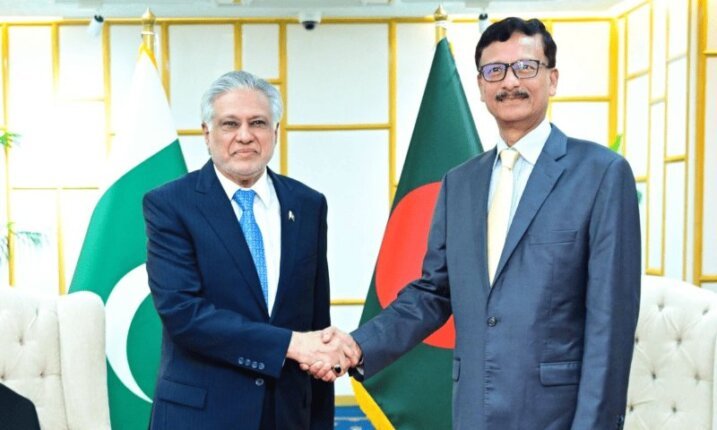Dhaka: In a landmark move to reset ties, Pakistan and Bangladesh on Sunday signed six important Memorandums of Understanding (MoUs), signalling a new phase of cooperation after more than a decade of frosty relations.
Deputy Prime Minister and Foreign Minister Ishaq Dar, who arrived in Dhaka on Saturday, co-chaired the signing ceremony with Bangladesh’s Adviser for Foreign Affairs Md Touhid Hossain.
The MoUs cover visa-free entry for diplomats and government officials, collaboration between foreign service academies, and a partnership between Associated Press of Pakistan (APP) and Bangladesh Sangbad Sangstha (BSS). Additional agreements include cooperation between the Institute of Strategic Studies Islamabad and the Bangladesh Institute of International and Strategic Studies, creation of a Joint Working Group on Trade, and a Cultural Exchange Programme spanning 2025–2028.
Dar is the most senior Pakistani official to visit Bangladesh since 2012, when Hina Rabbani Khar travelled to Dhaka. Relations under Sheikh Hasina’s 15-year rule were tense, but officials now describe the atmosphere as “constructive and cordial.”
Talks between Dar and Hossain touched on trade, investment, cultural exchanges, SAARC’s revival, and humanitarian concerns, including the Palestine and Rohingya issues. Dar also held a breakfast meeting with Bangladesh’s Adviser for Commerce Sk. Bashir Uddin, joined by senior Bangladeshi ministers and commerce officials, to discuss boosting connectivity and trade.
At a reception hosted by Pakistan’s High Commissioner Imran Haider, Dar emphasised that Pakistan and Bangladesh share “fraternal sentiments and centuries-old traditions,” stressing the need for a forward-looking partnership.
Bilateral trade is already seeing a revival. Earlier this year, the two countries launched the first-ever direct sea trade route, while direct flights are expected soon. Defence cooperation has also picked up, with a senior Bangladeshi general visiting Pakistan in January—the first such military exchange in many years.
Analysts note India’s unease over this rapprochement, as the ouster of Sheikh Hasina has reshaped regional dynamics. Dhaka’s interim government is pursuing stronger ties with Islamabad while also seeking Hasina’s extradition from India, where she currently lives in exile.



